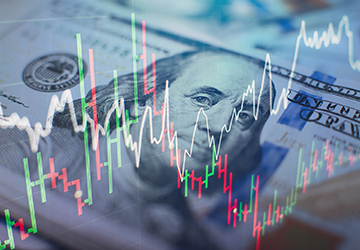Why the Stock Market Reacts to Geopolitical Events
The intricacies of the global financial system can be bewildering. Geopolitics is one of the many factors that play a pivotal role in shaping stock markets worldwide. A clear understanding of the geopolitics influence on the financial world can provide valuable insights for investors. This article delves into the geopolitical stock market impact and analyzes the reasons behind the market's reactions to international events.
1.The Nature of the Stock Market
At its core, the stock market reflects both economic data and the collective sentiment of investors. Share prices fluctuate based on the available information, including predictions about future economic conditions. A market reaction analysis is a mirror reflecting both the present state of affairs and anticipations about the future.
2.Geopolitics: A Significant Influencer
Geopolitical events can range from elections in significant economies to tensions between countries or even war. Such events can have immediate and profound effects on the economic environment of a country or region, thereby influencing the stock market.
For instance, geopolitical tensions can lead to trade relations uncertainties, affecting international businesses and their projected revenues. This direct connection underscores the importance of geopolitics influence on the stock market dynamics.

3.International Event Effect: Uncertainty is Key
When assessing the international event effect on stock markets, uncertainty is the primary emotion to consider. Markets tend to react negatively to unpredictability because investors crave stability. Geopolitical events, by their very nature, introduce elements of uncertainty.
Imagine a scenario where two countries are on the brink of a trade war. Expecting potential tariffs can lead to market declines, even if the event has not occurred. Such a scenario is a testament to the weight of the geopolitical stock market impact on investors' minds.
4.Market Reaction Analysis: A Deep Dive
When performing a market reaction analysis after a significant geopolitical event, several patterns emerge:
● Short-Term Volatility: Markets can exhibit heightened volatility immediately after an event. The initial reactions are primarily driven by sentiment rather than a rational assessment of the event's long-term consequences.
● Medium-Term Adjustments: As the dust settles, the market starts to adjust based on a mix of sentiment and economic projections. This period could witness corrections if the initial reaction were deemed an overreaction.
● Long-Term Trends: Over time, the market will reflect the genuine economic impact of the event. This phase can take months or even years to manifest fully.
5.An Ever-evolving Relationship
While the geopolitics influence on stock markets is undeniable, the nature of this relationship keeps evolving. With the rise of global interconnectivity, events in one corner of the world can have repercussions in another, underscoring the global international event effect.
However, with better information dissemination and more sophisticated market instruments, modern stock markets can also be more resilient to shocks than in the past.
6.Case Studies: Real-world Examples of Geopolitical Stock Market Impact
● Brexit: The unexpected result of the UK's 2016 referendum on EU membership sent shockwaves throughout global markets. The immediate aftermath saw a steep decline in the British pound and global stock markets, emphasizing the strong geopolitics influence.
● U.S.-China Trade War: Commencing in 2018, escalating tariffs between these two economic giants resulted in global market fluctuations. The uncertainty stemming from their negotiations had a visible international event effect on indices worldwide.
7.Defensive vs. Aggressive Investment Strategies During Geopolitical Events
When faced with geopolitical turbulence, investors often face a choice:
● Defensive Strategy: Investors move towards safe-haven assets like gold, government bonds, or stable currencies. Such a strategy focuses on capital preservation during uncertain times.
● Aggressive Strategy: Contrarian investors might see geopolitical unrest as an opportunity, buying undervalued stocks that may rebound once stability returns. Such a strategy focuses on potentially high returns, albeit at a higher risk.

8.The Role of News and Media in Market Reactions
● Immediate Repercussions: Instant news updates can lead to rapid market movements. A tweet, press release, or news flash can result in sudden spikes or drops.
● Analysis and Speculation: Post-event, analysts, and experts weigh in, further influencing investor sentiment and the subsequent market reaction analysis.
9.The Future: Navigating Geopolitical Influences in a Connected World
The geopolitical stock market impact will grow significantly as our world becomes more interconnected. Future considerations include:
● Emerging Markets: As nations like India, Brazil, and various African countries grow economically, their local geopolitical events will have broader global implications.
● Technological Disruptions: Events like cyberattacks or tech bans can have vast repercussions on tech-heavy indices, especially given the dominance of tech giants in major stock markets.
● Environmental and Health Considerations: As the world grapples with climate change or health crises, the geopolitical decisions surrounding these issues will inevitably influence markets.
10.The Psychological Play: Investor Emotions and Geopolitical Events
Often underestimated, the psychological component is crucial to understanding the geopolitical stock market impact. The fear of the unknown and the human tendency to react strongly to negative news can lead to more pronounced market downturns during major geopolitical disruptions. Conversely, favorable resolutions can result in exaggerated upswings buoyed by collective relief and optimism. Investors must recognize these emotional currents and strive for rational decision-making, separating fact from fear. Embracing a balanced approach – one that acknowledges the emotional weight of geopolitics influence but remains grounded in objective analysis – is critical to navigating market tumult successfully.
Concluding Thoughts
Understanding the geopolitical stock market impact is essential for investors. Being able to anticipate market reactions based on geopolitical events can be a significant advantage in navigating the often turbulent waters of the stock market.
Moreover, while geopolitical events introduce uncertainty, they also present opportunities. For instance, a market dip resulting from a geopolitical event can be an opportune moment for long-term investors to invest at discounted prices.
In summary, the dance between geopolitics and stock markets is intricate and filled with challenges and opportunities. A keen grasp of geopolitics influence and a thorough market reaction analysis can give investors the insights they need to thrive.


